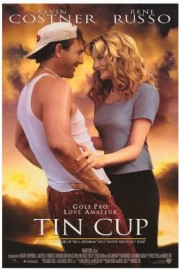Tin Cup
In “Tin Cup,” writer-director Ron Shelton and star Kevin Costner are essentially transplanting the formula they worked so successfully in “Bull Durham” to the world of golf. This time, however, there’s not a third person between Costner and the romantic lead who needs help with the mental part of the sport, and that’s what makes this work as well as this does. For 135 minutes, Shelton breaks down Costner’s Roy McAvoy to an unlikely final win that is also completely predictable. In other words, the type of finale that shows why the sports underdog story is as durable a formula as it is.
Rather than a minor league catcher, Costner’s Roy McAvoy is a different type of experienced “amateur”- a great college golfer who runs a dilapidated driving range in the middle of Texas. He usually spends his days drinking beer and hitting balls down the range, which he’ll collect at night, and start the day again. One day, a beautiful woman comes to the range wanting lessons. She is Dr. Molly Griswold (Rene Russo), a psychiatrist who just started working at a practice in town, and wants to know more about the game. She has all sorts of paraphernalia that “allegedly” will help people with their game, but like McAvoy, we can tell right away she was sold a bunch of useless shit. After one lesson, she’s hitting the ball well, and he’s been struck by her beauty and intelligence. Turns out, though, that she’s unavailable- her boyfriend is David Simms (Don Johnson), a smug pro golfer who was a collegiate rival of Roy’s. Is that enough to get Roy to take a shot at the pros? Do armadillos roam free in the Texas desert?
1996 was probably the high point of Rene Russo’s career as an actress, and that is a damning indictment on Hollywood’s inability to feed her great roles afterwards. While she has had great moments in the 25 years since (most notably, “The Thomas Crown Affair,” “Nightcrawler” and “Avengers: Endgame”), the 1-2 punch of “Tin Cup” and “Ransom” in ’96 is the best representation of her range, talent, and the chemistry she could have with her co-stars when the material was there. Here, she is an intelligent woman who doesn’t fall easily for McAvoy’s charms, though there is a natural back-and-forth between them. She views Simms as a safer choice, and sees how screwed up McAvoy is; of course they will end up together, but not until McAvoy has to come see her as a patient- he has to get his head right if he’s going to succeed at the U.S. Open, but late in the movie, when he starts to develop the “shanks,” he is shown as desperate as she was earlier in the film. For golf-related issues, though, she directs him to Romeo (Cheech Marin), his co-worker at the range, and his caddie on the fairway. Of course there is more for her to help him with, and we believe it because of how well Costner and Russo work together.
While a minor league baseball player before he turned to filmmaking, Shelton has an innate awareness of the psychology of sports that extends to the other ones he went on to examine in his career, whether it was golf here, basketball in “White Men Can’t Jump” and his script for “Blue Chips,” or boxing in “The Great White Hype” and “Play It to the Bone.” In “Tin Cup,” it’s all about the mental game, as that is what McAvoy struggles with. Having Molly and Romeo catering to different aspects of that for him was a smart move- Molly appeals to his natural instincts, while Romeo is trying to get him to think strategically. That tension arises between the two approaches is to be expected, and never is that clearer than on his path to the Open. He and Romeo get into a pissing contests in the qualifying rounds, and to be fair, Romeo’s attempts to loosen him up before the Open almost derail things when the hung-over McAvoy shoots an insane 83 in the first round. The turning point comes when Molly finds a way to appeal to that instinctual nature in Roy, and he gets his groove back. Golf seems like a dull sport to watch, but the way Shelton shoots it here, it’s one of the most triumphant stretches of film a sports movie has ever made.
The moment people always will remember from “Tin Cup,” however, is the ending. McAvoy has tried for three days to try and clear the water to get to the green on the 18th hole at the Open, and every day, it’s gone in the water. That nagging feeling triggers his ego, and on the forth day, with the Open on the line, he goes for it again. It’s his best attempt to date, but the same result. If you know the scene, you know what happens. If you don’t, all I’ll say is it’s one of the great triumphs in sports movie history because of how it doesn’t go as you expect, and sometimes, it’s the great moments in defeat that people best remember, rather than the ones that lead to victory. When that happens, “Tin Cup” hits a hole in one.










